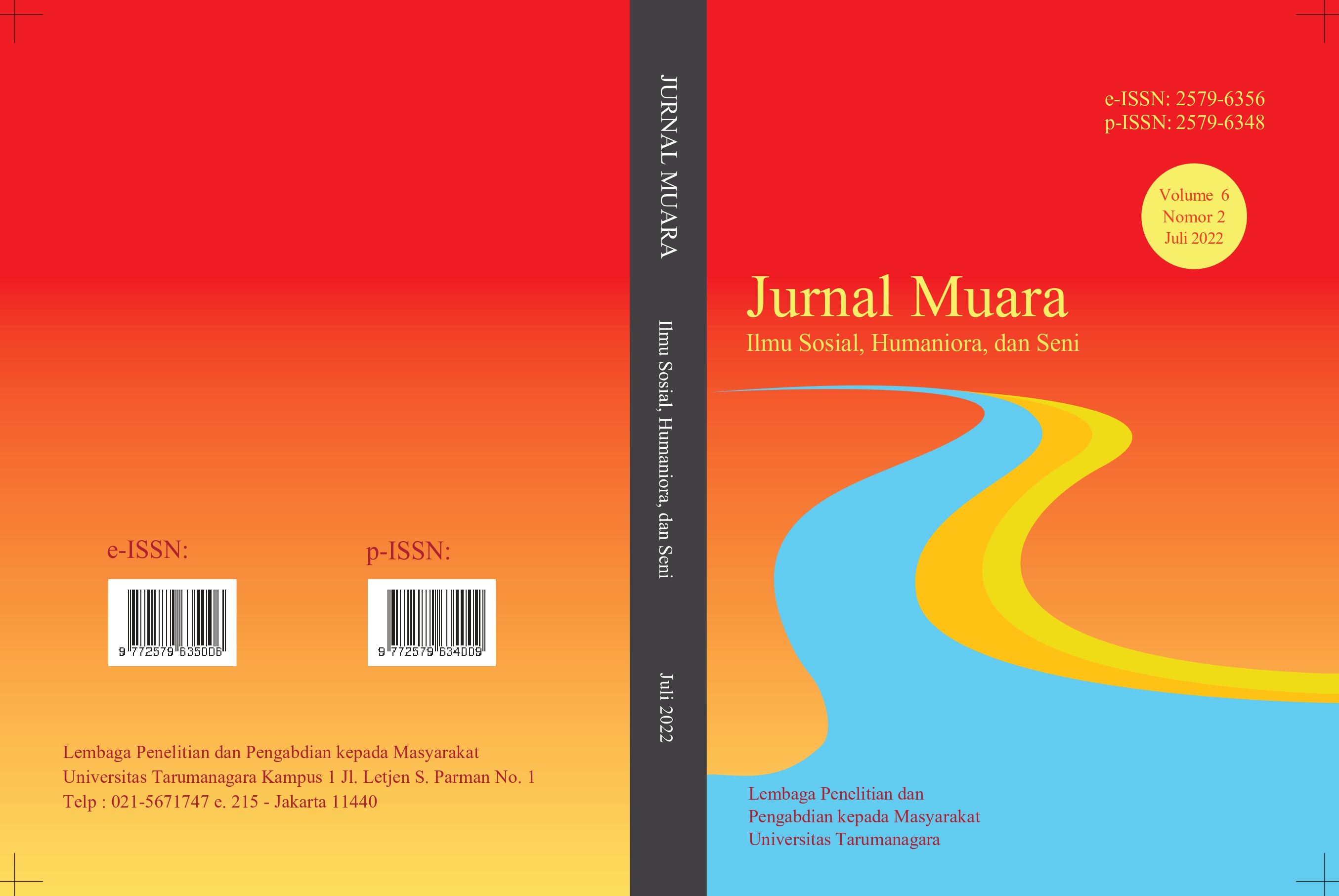PERAN SOCIAL COMPARISON TERHADAP KEBAHAGIAAN (STUDI PADA EMERGING ADULTHOOD PENGGUNA INSTAGRAM)
Main Article Content
Abstract
Penggunaan media sosial dapat menimbulkan social comparison yang mempunyai efek tidak langsung pada
kebahagiaan melalui fitur berbagi gambar di Instagram. Individu mempunyai sifat naluriah yang mendorong
terjadinya social comparison sehingga dapat dipahami dengan semakin kuat kecenderungan untuk berubah
dikarenakan kedekatan jarak antara individu dengan pembanding dapat menjadi indikator evaluasi yang lebih tepat
mengenai pendapat dan kemampuan satu sama lain. Tujuan dari penelitian ini adalah untuk mengetahui dan
memahami peran social comparison terhadap kebahagiaan pada emerging adulthood pengguna Instagram. Penelitian
ini menggunakan metode kuantitatif non-eksperimental dengan jumlah partisipan sebanyak 731 partisipan yang
mempunyai dan menggunakan akun Instagram dan diperoleh dengan menyebarkan kuesioner online. Terdapat dua
instrumen, yaitu The PERMA-Profiler Terjemahan oleh Elfida et al. (2021) untuk mengukur variabel kebahagiaan dan
11-item Iowa-Netherlands Comparison Orientation Measure oleh Gibbons dan Buunk (1999) untuk mengukur
variabel social comparison yang diolah dengan menggunakan SPSS versi 26.00. Data diolah menggunakan uji regresi
sederhana dan hasil penelitian menunjukkan bahwa social comparison tidak memiliki peran terhadap kebahagiaan
secara signifikan (R=.049, p>0.05). Social comparison hanya memiliki peran terhadap dimensi engagement dari
kebahagiaan (R=.075, p<0.05). Hasil penelitian ini menyarankan adanya edukasi mengenai cara menggunakan
Instagram yang dapat mendukung peningkatan kebahagiaan serta penambahan variabel mediator atau moderator untuk
menunjang hasil yang signifikan.
Article Details

This work is licensed under a Creative Commons Attribution-NonCommercial-ShareAlike 4.0 International License.
This work is licensed under a Jurnal Muara Ilmu Sosial, Humaniora, dan Seni Creative Commons Attribution-ShareAlike 4.0 International License.References
Argyle, M., & Martin, M. (1991). The psychological causes of Happiness. In F. Strack, M. Argyle, & N. Schwarz (Eds.), Subjective well-being: An interdisciplinary perspective (1st ed., pp. 77–100). Pergamon Press.
Badan Pusat Statistik (BPS). (2021). Indeks Kebahagiaan 2021.
Chae, J. (2018). Reexamining the relationship between social media and happiness: The effects of various social media platforms on reconceptualized happiness. Telematics and Informatics, 35(6), 1656–1664. https://doi.org/10.1016/j.tele.2018.04.011
de Vries, D. A., Möller, A. M., Wieringa, M. S., Eigenraam, A. W., & Hamelink, K. (2017). Social comparison as the thief of joy: Emotional consequences of viewing strangers’ Instagram posts. Media Psychology, 21(2), 222–245. https://doi.org/10.1080/15213269.2016.1267647
Dörnyei, Z. (2007). Research methods in applied linguistics. Oxford University Press.
Elfida, D., Milla, M. N., Mansoer, W. W. D., & Takwin, B. (2021). Adaptasi dan uji properti psikometrik The PERMA-Profiler pada orang Indonesia. Persona: Jurnal Psikologi Indonesia, 10(1), 81–103. https://doi.org/10.30996/persona.v10i1.4986
Festinger, L. (1954). A Theory of social comparison processes. Human Relations, 7(2), 117–140. https://doi.org/10.1177/001872675400700202
Gibbons, F. X., & Buunk, B. P. (1999). Individual differences in social comparison: Development of a scale of social comparison orientation. Journal of Personality and Social Psychology, 76(1), 129–142.
Given, L. M. (2008). Convenience sample. In The SAGE Encyclopedia of Qualitative Research Methods. SAGE Publications.
Haferkamp, N., & Krämer, N. C. (2011). Social comparison 2.0: Examining the effects of online profiles on social-networking sites. Cyberpsychology, Behavior, and Social Networking, 14(5), 309–314. https://doi.org/10.1089/cyber.2010.0120
Hootsuite [We Are Social]. (2021). Digital 2021: Indonesia. https://datareportal.com/reports/digital-2021-indonesia
Khaw, D., & Kern, M. L. (2014). A cross-cultural comparison of the PERMA model of well-being. Undergraduate Journal of Psychology at Berkeley, 8(1), 10–23. http://ujpb.org/a-cross-cultural-comparison-of-the-perma-model-of-well-being/
Kim, S. J., & Hur, M.-H. (2019). Understanding of factors influencing happiness of middle-aged women in Korea based on Maslow’s hierarchy of needs. Psychiatry Investigation, 16(7). https://doi.org/10.30773/pi.2019.04.25.2
King, L. A. (Laura A. (2017). The science of psychology: an appreciative view. McGraw-Hill Education.
Lyubomirsky, S., & Lepper, H. S. (1999). A measure of subjective happiness: preliminary reliability and construct validation. Social Indicators Research, 46(2), 137–155. https://doi.org/10.1023/A:1006824100041
Maslow, A. H. (1970). Motivation and Personality (3rd ed.). Longman.
McAndrew, F. T., & Jeong, H. S. (2012). Who does what on Facebook? Age, sex, and relationship status as predictors of Facebook use. Computers in Human Behavior, 28(6), 2359–2365. https://doi.org/10.1016/j.chb.2012.07.007
Mehdizadeh, S. (2010). Self-Presentation 2.0: Narcissism and self-esteem on Facebook. Cyberpsychology, Behavior, and Social Networking, 13, 357–364. https://doi.org/10.1089/cyber.2009.0257
NapoleonCat. (2021). Instagram users in Indonesia (August 2021). https://napoleoncat.com/stats/instagram-users-in-indonesia/2021/08/
Seligman, M. E. (2012). Flourish: A visionary new understanding of happiness and well-being. Simon & Schuster, Inc.
Stapleton, P., Luiz, G., & Chatwin, H. (2017). Generation validation: The role of social comparison in use of Instagram among emerging adults. Cyberpsychology, Behavior, and Social Networking, 20(3), 142–149. https://doi.org/10.1089/cyber.2016.0444
Waterman, A. S., Schwartz, S. J., & Conti, R. (2008). The implications of two conceptions of happiness (hedonic enjoyment and eudaimonia) for the understanding of intrinsic motivation. Journal of Happiness Studies, 9(1), 41–79. https://doi.org/10.1007/s10902-006-9020-7
Wirtz, D., Tucker, A., Briggs, C., & Schoemann, A. M. (2021). How and why social media affect subjective well-being: Multi-site use and social comparison as predictors of change across time. Journal of Happiness Studies, 22(4), 1673–1691. https://doi.org/10.1007/s10902-020-00291-z
World Health Organization [WHO]. (2020). Health topics: Coronavirus disease (COVID-19). https://www.who.int/health-topics/coronavirus#tab=tab_1


